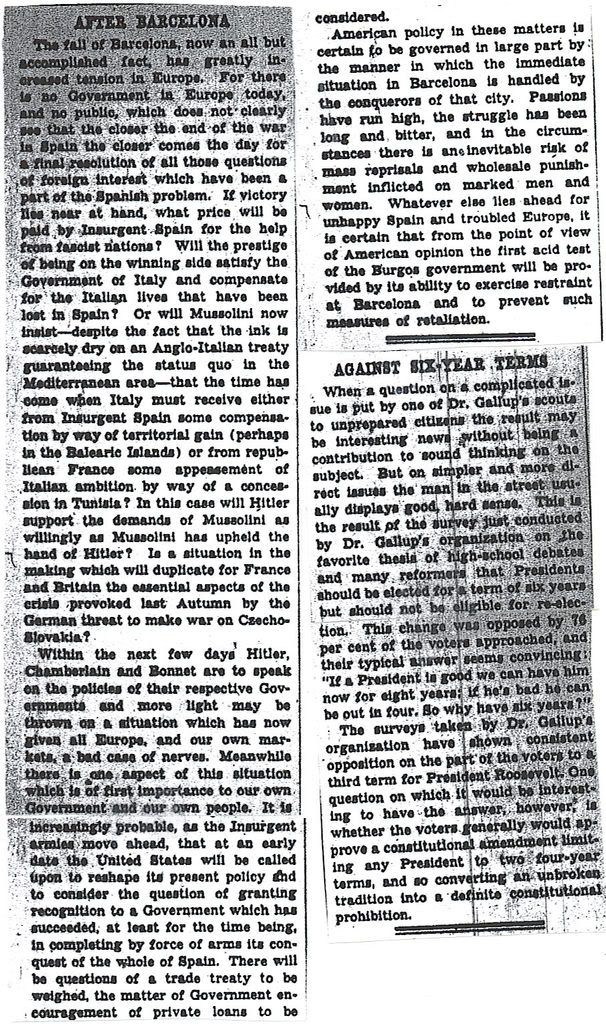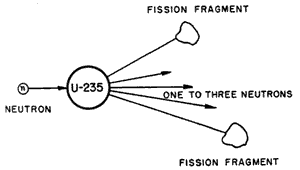
Posted on 01/26/2009 6:20:50 AM PST by Homer_J_Simpson

What? Do they mean will Mussolini invade Tunisia unless ethnic Italians there are granted autonomy? I do not understand the question.
Well since Germany does not have any weapons of mass destruction, I guess we should just stay out.....
Tunisia borders then Italian controlled Libya. Perhaps they were thinking about some adjustment of this border. In any case, as far as I knowm Franco completely stiffed the Axis on any form of payback for their help.
Hitler wrangled with Franco over allowing German troops to pass through Spain to get to the British at Gibraltar. They met face-to-face in the Pyrennees just after the fall of France. Franco refused. Hitler said trying to negotiate with Franco was the most frustrating experience of his life. He finally met his match in negotiations.
It would be unfair to Franco to say he totally stiffed the Germans. He had justifiable reasons to not enter a formal alliance with the Germans. He also provided some active cooperation.
1. His country just finished a long, bitter and destructive civil war. It was one of the poorest countries in Europe when the civil war started, and the war didn’t improve the situation. He really wasn’t in a position to provide full participation in a bigger, longer war.
2. He wasn’t a stupid man. He was glad to have the help of the Condor Legion, etc..., during the Civil War, but was frankly glad to be rid of them when they were no longer needed. If he allows German troops into his country on the theory of allowing them to attack Gibraltar, does he ever get rid of them? He’s probably smart to have refused.
3. He did provide material help to the Wehrmacht in the form of the “Spanish Blue Division” which was formally designated by the Germans as the 242nd Infantry Division. It was an all-volunteer outfit of fascist Spaniards that Franco allowed to serve with the Germans on the Eastern Front. It had a splendid combat record until Franco recalled it in 1943. The “Blue Division” accomplished two things for Franco; it allowed him to show some payback to the Germans, and it got rid of some hotheads that might have caused trouble at home. By the time he recalled the division, it looked a lot less like Germany would win the war, and many of the hotheads had been killed by the Russians.
I certainly was not critical of Franco, basically I agree with your points. In addition I think it is usually agreed that Franco was more of an authoritarian in the long tradition of Spain, rather than a devotee of the Fascist corporate state.
The voter quoted in the Gallup poll points out an interesting assumption by the general public that will be dispelled next year. The voter says if we like the president we can have him for 8 years. The assumption being that a president cant run for a 3rd term and be president for 12 (or more).
Of course the 8 year thing was really just tradition set by Washington when he refused to run for a 3rd term. Roosevelt will break that tradition (right or wrong) in 1940 when he runs for a 3rd term.
DISCOVERY OF URANIUM FISSION
1.52. As has already been mentioned, the neutron proved to be the most effective particle for inducing nuclear changes. This was particularly true for the elements of highest atomic number and weight where the large nuclear charge exerts strong repulsive forces on deuteron or proton projectiles but not on uncharged neutrons. The results of the bombardment of uranium by neutrons had proved interesting and puzzling. First studied by Fermi and his colleagues in 1934, they were not properly interpreted until several years later.
1.53. On January 16, 1939, Niels Bohr of Copenhagen, Denmark, arrived in this country to spend several months in Princeton, N. J., and was particularly anxious to discuss some abstract problems with Einstein. (Four years later Bohr was to escape from Nazi-occupied Denmark in a small boat.) Just before Bohr left Denmark two of his colleagues, O. R. Frisch and L. Meitner (both refugees from Germany), had told him their guess that the absorption of a neutron by a uranium nucleus sometimes caused that nucleus to split into approximately equal parts with the release of enormous quantities of energy, a process that soon began to be called nuclear "fission." The occasion for this hypothesis was the important discovery of O. Hahn and F. Strassmann in Germany (published in Naturwissenschaften in early January 1939) which proved that an isotope of barium was produced by neutron bombardment of uranium. Immediately on arrival in the United States Bohr communicated this idea to his former student J. A. Wheeler and others at Princeton, and from them the news spread by word of mouth to neighboring physicists including E. Fermi at Columbia University. As a result of conversations among Fermi, J. R. Dunning, and G. B. Pegram, a search was undertaken at Columbia for the heavy pulses of ionization that would be expected from the flying fragments of the uranium nucleus. On January 26, 1939, there was a conference on theoretical physics at Washington, D. C., sponsored jointly by the George Washington University and the Carnegie Institution of Washington. Fermi left New York to attend this meeting before the Columbia fission experiments had been tried. At the meeting Bohr and Fermi discussed the problem of fission, and in particular Fermi mentioned the possibility that neutrons might be emitted during the process. Although this was only a guess, its implication of the possibility of a chain reaction was obvious. A number of sensational articles 
were published in the press on this subject. Before the meeting in Washington was over, several other experiments to confirm fission had been initiated, and positive experimental confirmation was reported from four laboratories (Columbia University, Carnegie Institution of Washington, Johns Hopkins University, University of California) in the February 15, 1939, issue of the Physical Review. By this time Bohr had heard that similar experiments had been made in his laboratory in Copenhagen about January 15. (Letter by Frisch to Nature dated January 16, 1939, and appearing in the February 18 issue.) F. Joliot in Paris had also published his first results in the Comptes Rendus of January 30, 1939. From this time on there was a steady flow of papers on the subject of fission, so that by the time (December 6, 1939) L. A. Turner of Princeton wrote a review article on the subject in the Reviews of Modern Physics nearly one hundred papers had appeared. Complete analysis and discussion of these papers have appeared in Turner's article and elsewhere.
-Atomic Energy for Military Purposes, by Henry DeWolf Smyth, 1945
General Franco’s Spain paid all the war material supplied by Germany and Italy through shipments of ore. In the case of Germany, tungsten ore. Tungsten is used to harden iron alloys.
During last years of WWII, the protests of the allies, threatening the oil supply from Texas, prompted Gen. Franco to establish a free market of tungsten ore (when, in contradiction, all the Spanish economy was controlled by the government: the entire harvests had to be sold to the “National Wheat Service”, for instance). Whoever paid a better price for it, got it.
In those times the debt with Germany had been paid, so Hitler had to send gold from Switzerland. That motivated a compensation after the war, because that gold came from the sacking of the entire Europe.
However, the scheme seemed to be more fair that the one going on in Portugal.
AFAIK the ore continued reaching the French border until May 1944, although since February that year, under threats of the allied countries now clearly winning the war, the dispatches were oficially stopped.
Mineral ore paid for some material sold as junk after the war, during the years of the blockade, bought in order to repair it and put into service to help with the necessities of post-war Spain.
Unfortunately for Hitler, his meeting with Gen. Franco happened too late, October 1940, when it was clear the so hoped rapid victory over Britain (Mussolini entered the war for such reason) was not taking place.
At that point, Gen. Franco had already received reports from the top command of the Spanish navy, concerned with the exposure of the Canary Islands, which could not withstand an attack and landing of the Royal Navy.
Because in Gen. Franco’s decisions had a great influence, logically, past wars. The French invasion in 1808 (Napoleon’s France then an ally), in which the French troops whose oficial objective was Portugal (in the British side) took other direction; and the war against the United States, 42 years before, whose result could be repeated in the Canary Islands.
So the navy advised against Spain joining the war in Hitler’s side at least until the war in the Mediterranean were over, so part of the Italian navy could move to Gibraltar (now conquered), air wings could be based in Morocco to protect the Canary islands and part of the Spanish commerce and fisheries (very important those post war years) in the Atlantic was somewhat replaced by some in the Mediterranean, even with supplies from the Soviet Union via de Black Sea.
Disclaimer: Opinions posted on Free Republic are those of the individual posters and do not necessarily represent the opinion of Free Republic or its management. All materials posted herein are protected by copyright law and the exemption for fair use of copyrighted works.